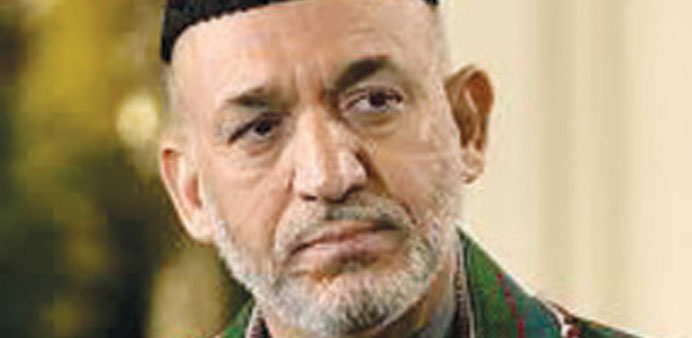DPA/Kabul
As he neared the end of his tenure as Afghanistan’s president, Hamid Karzai was fond of expressing his eagerness to retire from the post he held for 13 years.
Now out of office, the 57-year-old says he is happy and comfortable in his new role as elder statesman.
“I keep busy. I am relaxing. I have a lot of friends visit me, a lot of Afghans visit me,” said Karzai from his century-old house, which is inside a palatial compound just outside the presidential palace.
No vehicles, including of his own staff members, are allowed into the highly secured estate, which is frequently visited by current and former government officials.
“The biggest satisfactions have really come to me after I left office,” he said.
Karzai was selected, in absentia, to be interim president after the US-led invasion in 2001. He took over at a time when the country was in tatters, following decades of war and extremist Taliban rule.
Thirteen years later, the war drags on, but there are achievements, including in telecommunications, education, media and economy, albeit largely powered by aid money.
President Ashraf Ghani, who took over from Karzai in September, regularly visits him to provide updates and seek counsel on “major national issues.”
On Thursday, Ghani told Karzai about peace overtures by the Afghan Taliban, which have been waging war against the government and its foreign allies since 2001, Karzai said.
“I am very much looking forward to the start of the peace talks, whatever the circumstances of the beginning of those talks,” Karzai said.
“I am in full support of the talks,” he said, adding that he looks forward to them “very eagerly and enthusiastically.”
Karzai’s long-time pursuit of peace negotiations were futile. He even formed a High Peace Council, only to have the head of the initiative, an ex-president, killed in a suicide attack.
For Karzai, Pakistan and the United States hold the key to the long-running Afghan conflict, in which thousands have been killed.
“The lack of trust (with the US) began with the civilian casualties,” said Karzai, who regularly called out Pakistan for providing the Taliban with safe haven, and the US for not targeting the group’s sanctuaries.
Relations between the two neighbours hit a low during his rule.
Karzai said “the so-called war on terror was a side show.”
In pursuit of the larger interests of the US, Afghan people were “stepped over and undermined,” he said. “That’s why they did not go to address the issue of terrorism in Pakistan.”
“The US after getting the bases in Afghanistan, after getting the bilateral security agreement signed, announced that the Taliban were no longer their enemies,” Karzai said.
For months Karzai objected to the agreement, a military deal that allowed foreign troops to train and advise Afghan forces, as well as run unilateral counterterrorism operations.
Ghani signed the deal on his second day in the office.
“I began to see the US trying to have the bases in Afghanistan, but also trying to, in a way, sub-contract us to Pakistan,” Karzai said.
In Ghani, the Pakistani military establishment has found a better partner to work with, unlike Karzai, whom they assumed was pro-India. Ghani started lobbying for talks since he became president.
For now, Karzai says, “we are simply eager” to sit down with the Taliban for talks. “The very fact of the peace process beginning is important for us. We must begin to talk to our Afghan Taliban.”
He said he welcomed Pakistan’s expressed interest in peace.
“We will take the offer and [as the peace process unfolds] we will know whether it is genuine or not,” Karzai said.
Karzai admitted making mistakes during his rule, but said they were usually “mistakes of governance or of improvement of institutions, of day-to-day life.”
“In areas there was strategic interest in combating terrorism, combating radicalism. The Afghans not only worked hard but they were ready to sacrifice their lives as they did. There, we were betrayed.”
His administration was dogged by a series of problems, including lack of capacity and rampant corruption that his detractors accuse him of not reining in.
But Karzai said the US “tried to undermine me and my government in the name of corruption” when he tried to oppose the US conduct in Afghanistan.
“A corruption that they spread themselves. The billions of dollars of contracts were not in our hands, those were in the hands of the US.”
“They issued those contracts, not a single contract even worth a $100 was signed by me in the past 13 years, never. So it was all their business.”

u201cI am very much looking forward to the start of the peace talks, whatever the circumstances of the beginning of those talksu201d
